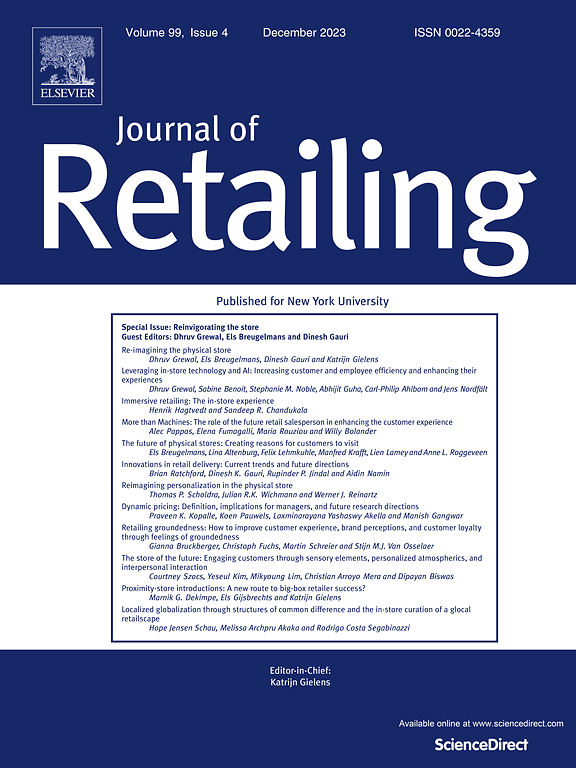Identity discounts
IF 10.2
1区 管理学
Q1 BUSINESS
引用次数: 0
Abstract
Price discounts present a dilemma for managers. Despite being an effective lever for increasing sales, discounts elicit negative quality perceptions and thus ultimately damage the brand. However, discounts based on the customer's identity, such as senior citizen, military, veteran, student, teacher, first responder, and healthcare worker discounts, are becoming increasingly prevalent. As such, this investigation introduces identity discounts – i.e., price discounts made available to consumers based exclusively on an element of their identity– and explores their novel effects on consumer product responses. Across five studies we find that identity discounts elicit an association between the product and the self, resulting in the creation of psychological ownership. Thus, because psychologically owned and self-associated objects are better liked and receive more favorable evaluations, we find that identity discounts mitigate the otherwise harmful effects of discounting on quality perceptions. However, the present research also reveals that the novel effects of identity discounts are dependent on identity congruence, such that psychological ownership and enhanced product evaluations only result when the promoted identity is deemed desirable (congruent) by consumers. For example, senior citizen discounts create psychological ownership and improve product evaluations when offered to older consumers who embrace the senior citizen identity but are as damaging as traditional discounts when offered to younger seniors who do not. Therefore, while our research suggests retailers should continue to include identity discounts in their promotional toolbox as they can confer benefits that traditional discounts do not, it also offers a cautionary warning: as consumer identities are heterogenous, so too are the effects of identity discounts.
身份的折扣
价格折扣使经理们进退两难。尽管折扣是增加销售的有效杠杆,但它会引发对质量的负面看法,从而最终损害品牌。然而,基于客户身份的折扣,如老年人、军人、退伍军人、学生、教师、急救人员和医护人员折扣,正变得越来越普遍。因此,本调查引入了身份折扣——即,仅根据消费者身份的某一要素向消费者提供的价格折扣——并探讨了它们对消费者产品反应的新影响。在五项研究中,我们发现身份折扣引发了产品和自我之间的联系,从而产生了心理所有权。因此,由于心理上拥有和自我相关的物品更受欢迎,并获得更有利的评价,我们发现身份折扣减轻了折扣对质量感知的其他有害影响。然而,本研究也揭示了身份折扣的新效应依赖于身份一致性,因此只有当消费者认为所提升的身份是可取的(一致性)时,心理所有权和增强的产品评价才会产生。例如,老年人折扣在提供给接受老年人身份的老年消费者时,会产生心理所有权,并提高产品评价,但在提供给不接受老年人身份的年轻老年人时,其破坏性与传统折扣一样大。因此,尽管我们的研究表明零售商应该继续将身份折扣纳入他们的促销工具箱,因为它们可以带来传统折扣所没有的好处,但它也提供了一个警告:由于消费者身份是异质性的,身份折扣的效果也是异质性的。
本文章由计算机程序翻译,如有差异,请以英文原文为准。
求助全文
约1分钟内获得全文
求助全文
来源期刊

Journal of Retailing
BUSINESS-
CiteScore
15.90
自引率
6.00%
发文量
54
审稿时长
67 days
期刊介绍:
The focus of The Journal of Retailing is to advance knowledge and its practical application in the field of retailing. This includes various aspects such as retail management, evolution, and current theories. The journal covers both products and services in retail, supply chains and distribution channels that serve retailers, relationships between retailers and supply chain members, and direct marketing as well as emerging electronic markets for households. Articles published in the journal may take an economic or behavioral approach, but all are based on rigorous analysis and a deep understanding of relevant theories and existing literature. Empirical research follows the scientific method, employing modern sampling procedures and statistical analysis.
 求助内容:
求助内容: 应助结果提醒方式:
应助结果提醒方式:


